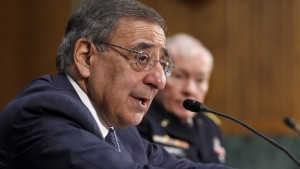 The nation’s top military leader said Wednesday that U.S. was considering “all possible additional steps” including “potential military options” in Syria, but stressed the administration was focused on “diplomatic and political approaches rather than a military intervention.”
The nation’s top military leader said Wednesday that U.S. was considering “all possible additional steps” including “potential military options” in Syria, but stressed the administration was focused on “diplomatic and political approaches rather than a military intervention.”
“What doesn’t make sense is to take unilateral action right now,” Defense Secretary Leon Panetta told the Senate Armed Services Committee about advising President Barack Obama to dispatch U.S. forces. “I’ve got to make very sure we know what the mission is … achieving that mission at what price.”
Still, he would “not rule out any future course of action,” amid continued pressure from several lawmakers for the U.S. to do more to end President Bashar Assad’s deadly crackdown on his people
The panel’s top Republican, Sen. John McCain of Arizona, said the estimated 7,500 dead and the bloodshed calls for U.S. leadership that a Democratic president, Bill Clinton, displayed during the Bosnian war in the 1990s and that Mr. Obama eventually showed on Libya last year.
“In past situations, America has led. We’re not leading, Mr. Secretary,” McCain told Panetta.
The Pentagon chief later added that the United States is not holding back and is leading in Iraq, Afghanistan, Syria and the war on terrorism.
Testifying before the committee, Army Gen. Martin Dempsey and Panetta offered a cautionary note to the call by McCain to launch U.S. airstrikes against Assad’s regime.
“This terrible situation has no simple answers,” Panetta told the panel.
Mr. Obama has resisted calls to step into the turmoil in Syria to stop Assad’s crackdown on protesters. He told a news conference Tuesday that the international community has not been able to muster a campaign against Syria like the one in Libya that ousted Muammar Qaddafi last year.
“For us to take military action unilaterally, as some have suggested, or to think that somehow there is some simple solution, I think is a mistake,” Mr. Obama said. “What happened in Libya was we mobilized the international community, had a U.N. Security Council mandate, had the full cooperation of the region, Arab states, and we knew that we could execute very effectively in a relatively short period of time. This is a much more complicated situation.”
Mr. Obama’s strategy has been to use sanctions and international diplomatic isolation to pressure Assad into handing over power.
CBS News

Leave a Reply
You must be logged in to post a comment.